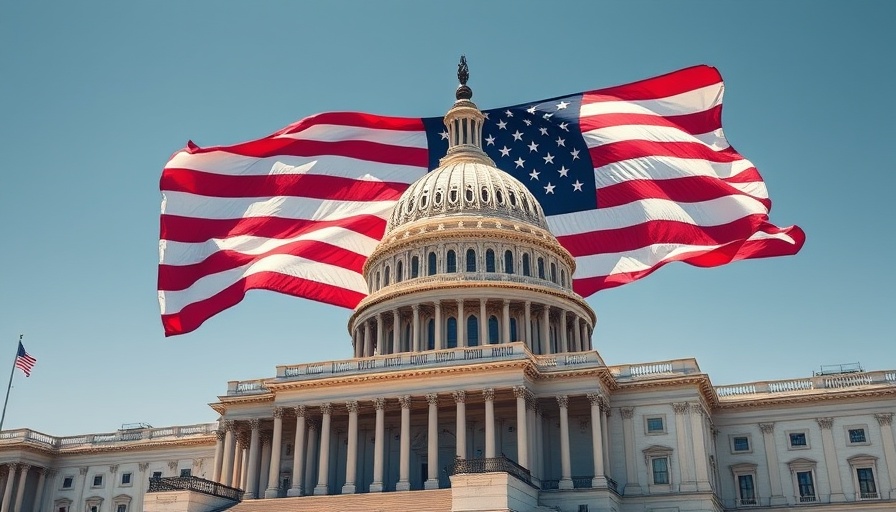
Conservative Welfare Reforms: A Chance for Change
The One Big Beautiful Bill (OBBB) has sparked significant debate across party lines, but at its core are welfare reforms designed to instill accountability within federal assistance programs. For seniors and retirees, understanding these changes could shape financial security for future generations.
With an emphasis on work requirements, the bill harkens back to successful strategies introduced during the 1996 welfare reform. This legislation aimed to combat dependency on federal aid, encouraging individuals to seek employment or education as a pathway out of poverty. The new OBBB framework applies similar principles, specifically targeting able-bodied adults in programs like Medicaid and food stamps.
Historical Context: Learning from the Past
In the mid-1990s, the United States faced criticisms surrounding welfare dependency due to an open-ended commitment to federal funding. The introduction of the Temporary Assistance for Needy Families (TANF) program encouraged recipients to pursue gainful employment or job training. This policy fundamentally altered the landscape of welfare, leading to a drastic reduction in caseloads and an increase in workforce participation. By applying these insights to the current climate, the OBBB promises financial accountability while targeting benefit roll reductions.
Why This Matters for Seniors and Retirees
As the elderly population continues to grow, so does the importance of sustainable government spending. The Congressional Budget Office estimates that the OBBB could generate around $1.1 trillion in savings through these welfare reforms over the next decade. This could have an immediate impact on how resources are allocated for programs crucial to seniors, such as Medicare and Social Security.
Furthermore, it is essential for today’s retirees and pre-retirees to remain informed on how federal spending impacts their financial future and the social programs they depend on. Understanding these changes allows seniors to advocate for programs and policies that prioritize their needs and well-being.
Community Engagement: The Key to Effective Reforms
The OBBB’s introduction of community engagement requirements for able-bodied Medicaid recipients positions states to foster work-related initiatives. By mandating just part-time engagement, it opens doors for many who might have previously relied solely on welfare. This approach could lead to healthier economic environments, with more participants in the workforce contributing to social security systems and reducing long-term tax burdens for retirees.
Counterarguments: Balancing Perspectives on Welfare Reforms
Of course, not everyone views the OBBB through a favorable lens. Critics argue these welfare cuts disproportionately affect vulnerable populations, including seniors, children, and the disabled. It's vital to recognize these concerns while acknowledging the need for reforms that ensure government resources don't incentivize dependency.
Striking a balance creates an opportunity for bipartisan support that not only aids in controlling costs but also improves the overall quality of life for those on welfare. Engaging in conversations around these reforms encourages a holistic understanding of both sides of the debate.
Practical Insights for Families and Caregivers
For families of seniors and caregivers, adapting to these reforms requires vigilance. Being well-informed about changes to welfare policies allows caregivers to better advocate for their loved ones. Here are some tips to navigate this landscape:
- Stay Updated: Keep abreast of local and national discussions on welfare reforms, as these changes may impact existing benefits.
- Educate Seniors: Engage in discussions with elderly family members about their benefits. This ensures they understand how to stay engaged in their health care choices.
- Community Support: Encourage active participation in community programs aimed at integration and employment opportunities for adults receiving assistance. This not only boosts personal confidence but strengthens community ties.
Conclusion: Taking an Active Role in Your Future
With the passing of the OBBB, it's essential for seniors, retirees, and their families to understand and engage in the dialogue around welfare reform. Keeping abreast of policy changes can empower families to make informed choices regarding educational and vocational opportunities for their loved ones.
Ultimately, taking an active role in understanding these transformations can foster a more secure financial future for all generations. Engaging with local advocacy groups or community organizations may provide platforms for sharing insights and navigating the complexities introduced by these reforms.
As discussions surrounding these policies evolve, I encourage readers to stay informed and involved, ensuring that the voices of seniors and retirees are heard amidst legislative shifts. How will you prepare for these changes in your community?
 Add Row
Add Row  Add
Add 




Write A Comment